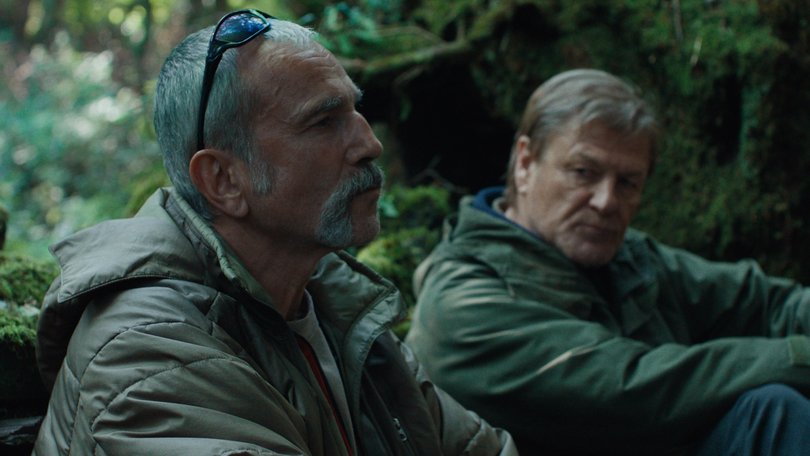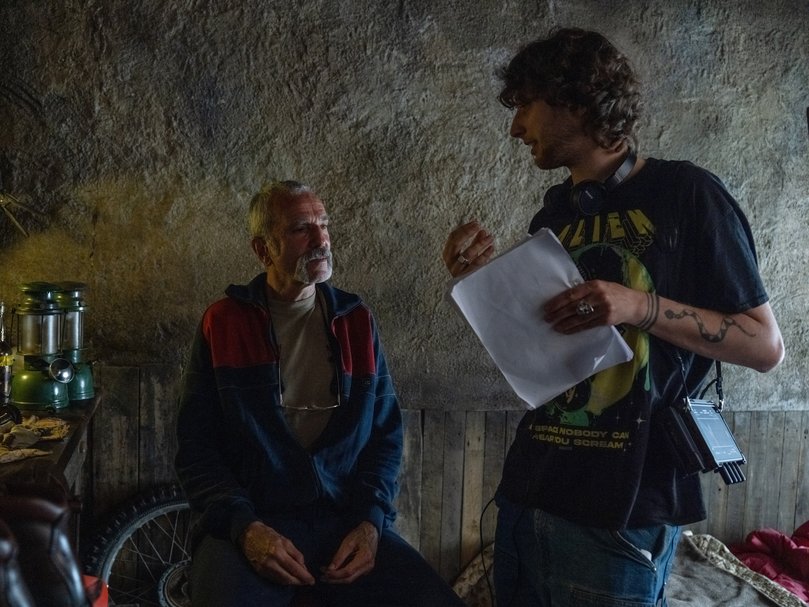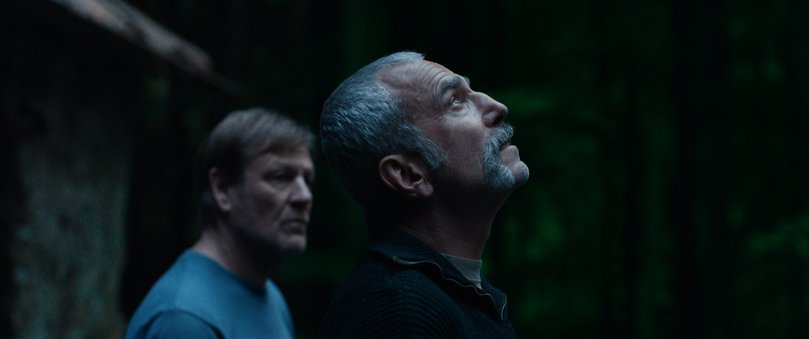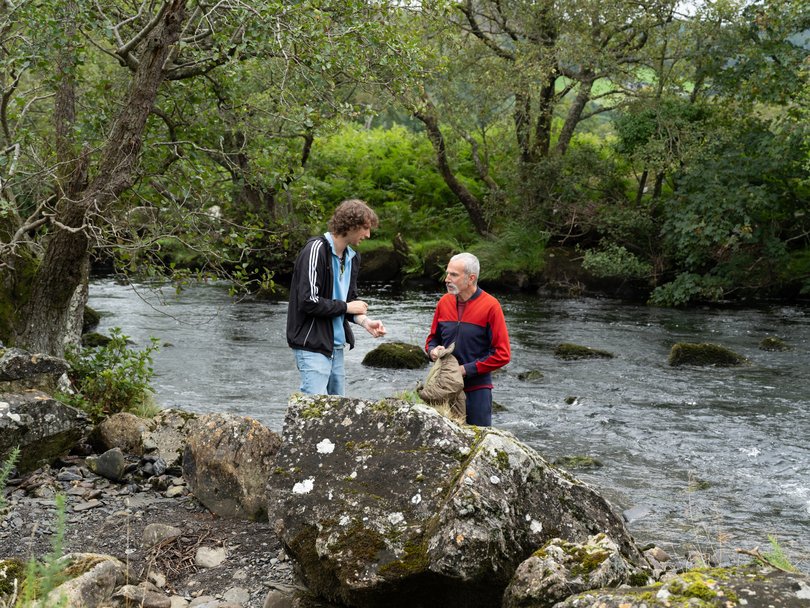Anemone interview: Daniel Day-Lewis and Ronan Day-Lewis leaned into family legacies
Daniel Day-Lewis had announced his retirement in 2017 but with his son Ronan, he’s back. The acclaimed actor talks to The Nightly.

When you’re working on a film about family with family, it’s hard not to draw parallels.
On screen, Daniel Day-Lewis is sitting shoulder-to-shoulder with Sean Bean, the pair playing estranged brothers Ray and Jem in Anemone, a quiet British-American co-production. There’s, at least at first, an uneasy silence between them.
Ray, a former British soldier who served in Northern Ireland, retreated to the woods almost two decades earlier, living as a virtual recluse. He ran away from the violence that marked his life, but he remains haunted by his experiences.
Sign up to The Nightly's newsletters.
Get the first look at the digital newspaper, curated daily stories and breaking headlines delivered to your inbox.
By continuing you agree to our Terms and Privacy Policy.Jem comes looking for Ray when Ray’s teenage son, Brian (Samuel Bottomley), runs into trouble and his mother (Samantha Morton), asks Ray to come home.
Offscreen, Daniel is sitting shoulder-to-shoulder with Ronan Day-Lewis, his son, director and co-screenwriter. There’s nothing strained about their dynamic in the hotel room where they’re doing press interviews. When the younger man speaks, Daniel watches his son, listening to every word, with an affectionate, proud smile on his face.
Anemone is Daniel’s return from retirement after he announced he was bowing out, eight years ago, on the release of Phantom Threads, his second film with Paul Thomas Anderson.

Usually, when an actor calls it a day, they just stop working, and only years later, they might vocalise that it was a deliberate choice. It was a noticeable move because while Daniel has never been that prolific, he said at the time he wanted to hold himself accountable.
He was also regarded as one of his generation’s greatest thespian talents, with three Oscars to his name, and three more nominations. His step-back was a real loss for the industry and for audiences.
Happily, he didn’t stay gone, confirming last year that we was returning in a film he wrote with his son, with Ronan to direct.
Like the character of Brian, Ronan also grew up with a family legacy, but instead of the ugliness of violence, it was the beauty of art.
He is third-generation, as the son of his actor father, the son of his filmmaker mother, Rebecca Miller, grandson of Cecil Day-Lewis, the UK poet laureate from 1968 to 1972, Jill Balcon, an actor, Arthur Miller, the famed playwright of Death of a Salesman and The Crucible, and Inge Morath, a photographer.
Art is in his veins. For many years, Ronan wanted to capture a story about brotherhood (he is one of three boys).
“Then when my dad approached me with the idea of us finding something to latch onto together, it was clear he also, independently, had this fascination with brotherhood, and specifically the silences between siblings and how communication can happen through those silences in an almost spiritual way,” he told The Nightly.

It took Daniel and Ronan four years to complete the script because they would only write when they were physically in the same room.
“That probably prolonged the whole experience just for that reason alone,” Daniel said. “But in a way, it was good because when we’d often go into the room, wherever it was, we weren’t sure what we would find.
“We didn’t write in sequence, necessarily, but we never came out of that room without something.”
The intimacy of their collaboration process subconsciously bled into Anemone, which features many scenes of Daniel and Bean’s characters sitting in or around Ray’s woodland hut. Even when they were out in nature, the characters were, as Daniel described of himself and Ronan, “two fellas confined in a small space”.
Unlike Ray and Jem, there was no emotional chasm between them. “Paradoxically, it was because of our closeness, which allowed us to explore the sort of darker possibilities of family,” Daniel said.
Ronan stressed that Anemone is in no way an autobiographical story, even though he could connect to the teenage Brian’s fascination with the mystery of his parents and their past lives.
“Things always do end up being personal in certain ways if you follow your true impulses,” Ronan said.
For Daniel, he also saw something of himself in Brian, having lost his father when he was 15 years old. “My experience, not through any violence whatsoever, but my experience of chasing a father figure was closer to Brian’s.
“The absence of his father is something that preoccupies him, and that was certainly true for me at his age.”
Directing Daniel would be intimidating for any director, let alone a first-time one and also his son. Ronan was nervous, but not about his father specifically, but all actors. He’d previously helmed shorts and music videos but a feature with not just Daniel but also the highly regarded Bean and Morton was a big step up.

He didn’t call on the likes of Anderson, Martin Scorsese or Jim Sheridan, who have all done two films each with Daniel, but he did talk with his mother, who directed Daniel in the 2005 film The Ballad of Jack and Rose.
“Her films have been just a massive inspiration for growing up, and some of her films are really my favourites, even though there’s obviously a bias there,” Ronan explained. “She always ends up having these wonderful rapports with actors and getting those amazing performances.
“And actors always speak really highly of their experiences working with her. I wanted to make that the actual experience of making the film was a good one for my dad specifically but for everyone, all the actors.”
Daniel has spent years preparing Ronan for this moment, not specifically working with him as actor and director, but as someone who might carry on the family legacy of making art.
“Knowing that Ronan was going to make films, I talked to him about the working relationship between actors and directors, and what, for the most part, seems to enrich that working relationship, and conversely, the things that strain it,” Daniel said.
Actor-and-director and father-and-son could be volatile and unpredictable bonds, but at least in the case of the Day-Lewises, both seems to fall on the right side of things.
The harmony off-screen may run in opposition to the conflict and drama on the screen, but it’s the reason Daniel Day-Lewis came out of retirement.
Anemone is screening across Australia as part of the British Film Festival until December 7, and in wide release from February 5.

